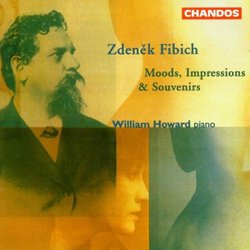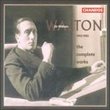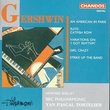| All Artists: Zdenek Fibich, William Howard Title: Fibich: Moods, Impressions & Souvenirs Members Wishing: 0 Total Copies: 0 Label: Chandos Release Date: 8/22/1995 Genre: Classical Styles: Chamber Music, Historical Periods, Classical (c.1770-1830) Number of Discs: 1 SwapaCD Credits: 1 UPC: 095115938126 |
Search - Zdenek Fibich, William Howard :: Fibich: Moods, Impressions & Souvenirs
 | Zdenek Fibich, William Howard Fibich: Moods, Impressions & Souvenirs Genre: Classical
No Description Available. Genre: Classical Music Media Format: Compact Disk Rating: Release Date: 22-AUG-1995 |
Larger Image |
CD DetailsSynopsis
Product Description No Description Available. Genre: Classical Music Media Format: Compact Disk Rating: Release Date: 22-AUG-1995 Similar CDs
|
CD ReviewsA long neglected composer's piano masterpiece recorded Jim Fellows | Connecticut, USA | 08/24/2008 (5 out of 5 stars) "This single disk recording presents 40 examples from the massive musical "diary" of the much neglected Czech composer Zdenek Fibich (1850-1900). Today, Fibich is far less known than Dvorak, Smetana, or Janacek. This may be because he was not a part of the "nationalist" music trend at that time. Fibich studied in the centers of European classical music before returning to his homeland, and his music reflects a European point of view at a time when Czech music was celebrated as a regional "flavor." Fibich clearly does not fit in this category, and probably requires a special category all his own.
Fibich was a successful composer in his time, best known for musical "melodramas" (narrated texts accompanied by orchestra) and opera. He was well employed as a conductor and composer in Prague. This recording provides excerpts from a much more private art form. These solo piano works come to us from his musical diary, a unique approach to composition in which Fibich's entries are piano meditations on the events of his day and emotional life. We know of the 376 that were published at the time, but there were probably more. Although almost unknown today, Fibich was considered a major Czech composer in his day. Pianists can find 7 books (pieces #1- #124 and #172-#204) at the Petrucci Music Library, which is part of the online International Music Score Library Project (loosely affiliated with project Gutenberg.) There is more to the story of these compositions. The diary served as an ongoing musical conversation with musical collaborator and former student Anezka Schulzova. The original manuscripts (each had a copy) contain all kinds of personal notes and playful innuendo. Their relationship is said to have caused some scandal in Prague. Fibich's wife and son died shortly after his son's birth, and Fibich was left to carry out his wife's dying wish that he marry her sister who would care for the composer and their surviving daughter. It wasn't until much later in his life that he again felt the type of profound love he shared with his first wife. And so, this late work celebrates the deep connection Fibich shared with Anezka Schulzova, who died a few years after him, in the first decade of the 20th century. This recording is, to my knowledge, the only recording devoted to this work still in print at this time. (There are sometimes used CDs by other performers available on Amazon through used CD sellers. At present they are quite expensive.) Fortunately, this Chandos release is an excellent recording in every way. William Howard has clearly devoted himself to this project in every detail. His playing is wonderfully clear and expressive. The piano is beautifully suited to the music, and has been unusually well voiced and prepared. The recording of both the piano and the acoustical ambience is among the best I've ever heard. I find the recording best suited to listening with headphones: the intimacy and spontaneity of invention becomes almost magical in this format. One unusual strength is the striking diversity of these compositions. Howard's interpretation brings them all together, yet allows each piece (or cluster of pieces) to speak in it's own unique voice. It is hard to think of any composer to compare Fibich to. At times he seems to have evolved directly from Schubert, while at other times he seems a precursor to many, even including early Prokofiev. There is an obvious link, both in period and flavor, with Grieg's Lyric Pieces; yet a direct comparison would be misleading if the reader were to believe that these two composers could ever be confused. In these miniatures and sketches one can hear intimacy and tenderness expressed through the masterful imagination of someone used to presenting large scale theatrical works to enthusiastic audiences. There are many moods: the irony of Satie (without the intentional sarcastic banality), joyfully rhythmic ingenuity, charming reflections glowing with the golden luster of twilight, deep contemplation, and a wonderfully mischievous use of unexpected transitions. Combining theatricality, in its best sense, with the many moods of intimate portraits, Fibich is in a league of his own. How could he be so little known? As for the quality of the recording, think of Gould's later recording of the Goldberg Variations. Fibich's best known piece (#139, sometimes referred to by the title "Poeme", from Jan Kubelick's transcription for piano and violin) is included (it was a piano sketch from his symphonic work "At Twilight".) This piece has benefited (and suffered) from the attention it's received from transcribers for various instrumental combinations. An uncredited piano transcription sometimes appears in collections of famous piano works. You Tube has more than enough examples of "Poeme", and some are terrifying! This is what can happen to a major composer when his life work is represented by only one piece in a variety of interpretations of transcriptions by yet other interpreters! Imagine if all we knew of Grieg was dozens of video clips of "Hall of The Mountain King" played by twelve year old clarinetists! This CD should be of interest to every pianist and especially those interested in the transition from romanticism to modernism. William Howard's work is as good as it gets." |

 Track Listings (40) - Disc #1
Track Listings (40) - Disc #1
